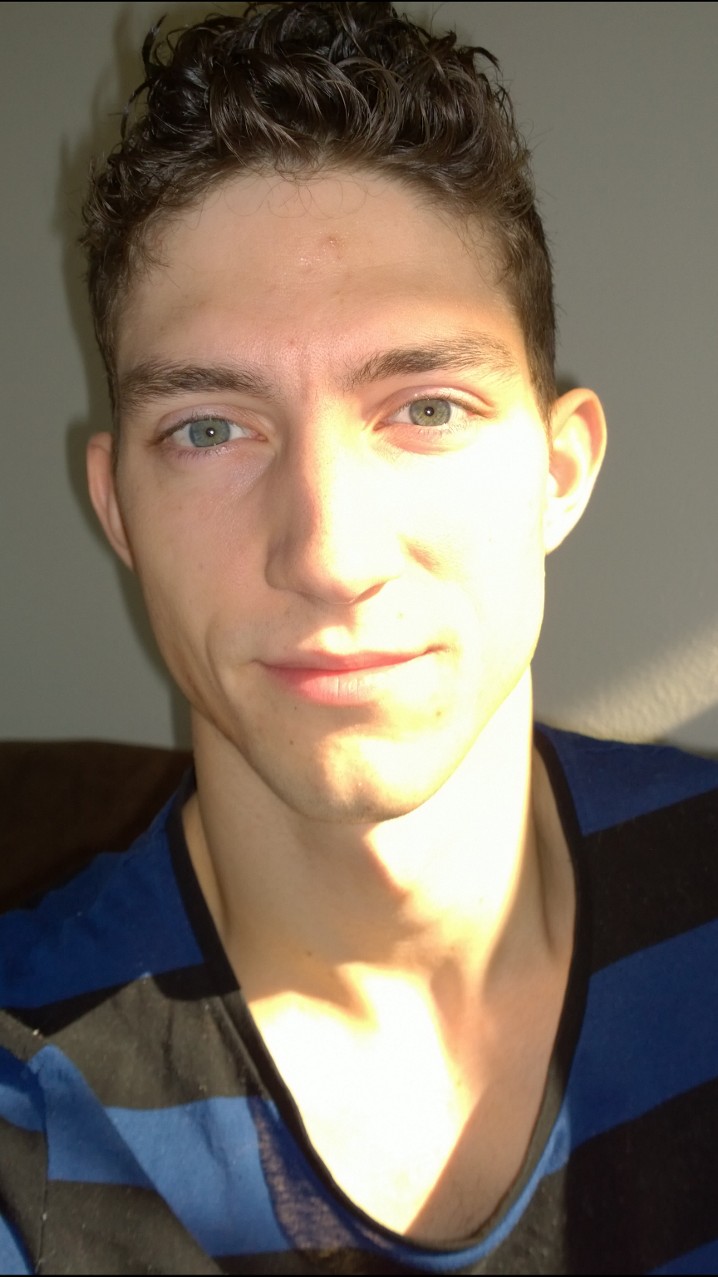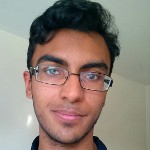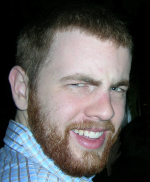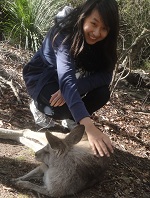Sunday February 10th 2013, 9:56 pm
Filed under:
Filed under:
Director |
|
 | Roger Levy My research focuses on theoretical and applied questions in the processing of natural language. Inherently, linguistic communication involves the resolution of uncertainty over a potentially unbounded set of possible signals and meanings. How can a fixed set of knowledge and resources be deployed to manage this uncertainty? To address these questions I use a combination of computational modelling and psycholinguistic experimentation. This work furthers our understanding of the cognitive underpinning of language processing, and helps us design models and algorithms that will allow machines to process human language. |
Postdocs |
|
 | Titus von der Malsburg I investigate how the human brain processes language during reading. Specifically, I'm interested in the strategies that we employ to incrementally build interpretations of sentences and how these strategies determine the path of our gaze through the text. My working hypothesis is that these reading strategies are dynamically adapted to task demands, cognitive constraints, and experience. A lot of my research consists of the development and application of novel experimental and analytical techniques. One method that I developed can be used to cluster gaze trajectories (a.k.a. scanpaths) in order to detect qualitatively different reading strategies. In related work, I used co-registration of eye movements and electric brain potentials to study brain responses contingent on the reading strategies observed using eyetracking. |
 | Eva Wittenberg I am interested in the decisions that speakers face when they wrap their messages in grammar. Which factors influence whether someone says, for example, "Alma gave Martin a hug“ instead of "Alma hugged Martin“ ? Speakers make such structural choices dozens of times per day, and listeners rapidly decode them, make inferences about why something was said in a particular way, and create a representation of the speaker’s intended meaning in their minds. I use a variety of psycholinguistic methods, as well as corpus analysis and computational modeling, to investigate this fascinating question at the interfaces of syntax, semantics, pragmatics, and conceptual structure. |
Graduate students |
|
 | Emily Morgan My research focuses on how people understand language in real-time, with a focus on syntactic parsing. I investigate this question using a variety of behavioral experimental methods and computational models. In particular, my research is motivated by looking at language through the lenses of information theory and noisy-channel models. I also investigate music processing from an information-theoretic perspective. |
 | Larry Muhlstein I am interested in how language enables us to communicate and compare thoughts and ideas between ourselves and others despite the fact that these thoughts and ideas are inaccessible directly. We see that communal coordination with a language of symbols structurally dissimilar to their referents enables this exchange of meaning, and I am investigating what is required of these communities and this linguistic interaction for meaning to be successfully transmitted. Amongst my tools for study are Bayesian models, information theory, linguistics, cognitive science, machine learning, and lots of communication. |
 | Mark Myslín I'm interested in the convergence of cognitive psychology, computational modeling, and everyday discourse and interaction. My research investigates the linguistic and real-world expectations speakers bring to discourse situations based on experience and memory, seeking to combine maximally naturalistic conversational data with rigorous psycholinguistic methodology. I combine computational modeling with corpus linguistics, eyetracking, and other experimental methods. |
 | Till Poppels I'm interested in understanding how people process language, focusing in particular on the emergence of meaning from interaction. What speakers mean is hugely underspecified by what they actually say, and I want to understand how listeners infer the missing pieces of the puzzle. Currently I am asking how listeners detect and repair speaker errors as they interpret sentences and to what extent they are willing to adopt a non-literal interpretation. I am also interested in the acquisition of word meanings and I am developing a growing suspicion that the learning problem is intimately linked to the question as to how speakers and listeners coordinate on meaning in conversation. |
 | Meilin Zhan My research interests lie in the three way interactions between theoretical, psycho- and computational linguistics, which entail the cognitive underpinning of language processing and computational modelling of sentence processing. I am also interested in bilingual language processing and the reciprocal effects of bilingualism and general cognition. |
Visitors |
|
 | Kentaro Nakatani (Konan University) My research interest lies in (i) the lexicon-syntax interface in the knowledge of language, and (ii) the real-time language comprehension and its relation to the use of memory resources. Regarding (i), I'm especially interested in aspectual properties of verbs/predicates and their interactions with grammar (e.g., why is "John pushed the cart for 30 seconds" fine, "John ate the apple for 30 seconds" a bit awkward, and "John killed the enemy for 30 seconds" abominable, I mean, in terms of grammaticality). Regarding (ii), I'm interested in how we deal with the resolution of multiple grammatical dependencies (thematic relations are the baseline, to which we can add other dependencies such as wh-interrogatives, NPIs, etc.) in on-line processing. |
Undergraduates |
|
 | Suhas Arehalli I am interested in the application of Computer Science and Mathematics to Linguistics, specifically with Natural Language Processing and models of language comprehension. I'm also intrigued by the use of Computer Science to streamline data processing and analysis. I'm currently focused on building my linguistics knowledge while assisting other's projects whenever possible. |
 | Hannah Campbell I am interested in language comprehension and acquisition, especially the neurophysiological bases of phenomena such as irony, metaphors, and jokes. I am currently involved in a corpus project analyzing binomial pairs in English text. |
 | Bonnie Chinh I find that some of the seemingly simplest aspects of language are the most complex. The parts of linguistics that I find most intriguing include grammar and the development of its rules, language acquisition, and language processing. Additionally, I am interested in how these ideas develop in the fields of cognitive linguistics and cognitive psychology. |
 | Abhishek Goyal I am currently working on studying patterns of short multi-word expressions (n-grams) over time. The synergy of Computer Science, Linguistics, and Mathematics intrigues me a lot. I am interested in Natural Language Processing and Human–computer interaction and hope to pursue them in the future. |
 | Jake Prasad I am especially interested in using computational modeling to reveal insights into how we write and talk. I believe that these insights could help with other tasks like information retrieval and computer dialog systems. I am currently working with Mark Myslin to analyze repitition of sentence structure in text. |
Alumni |
|
 | Klinton Bicknell (now assistant professor at Northwestern University) My research seeks to understand the remarkable efficiency of language comprehension. I investigate how we comprehend using a diverse set of methodologies: I build formal, computational models of comprehension using tools from computational linguistics and machine learning, and I also perform a wide range of empirical work, including both controlled experiments (especially eye tracking) and statistical analyses of large, naturalistic corpora. |
 | K. Michael Brooks (now a graduate student at Northwestern) My interests revolve around the psycho-, neuro-, and sociolinguistic aspects of phonological acquisition in normal and disordered populations. My Honors Thesis investigated the learnability of phonological interactions given only indirect evidence. |
 | Wednesday Bushong (now a PhD student at the University of Rochester) I'm really interested in language processing. Currently I am working on a project investigating to what extent people use their direct experience and abstract knowledge in the online processing of syntax. I'm also fascinated by language acquisition and how people get their abstract knowledge about language in the first place. I hope to further study these questions in graduate school. |
 | Rebecca Colavin My main area of interest is computational phonology. I am interested in phonotactics, the set of language specific rules that determine the acceptability of sound sequences. In particular, I am interested in the nature of the phonotactic grammar and the relationship between lexical frequency and gradient speaker judgments. |
 | Gabriel Doyle (now a postdoctoral fellow at Stanford University) I like problems where a language learner can use -- or even has to use -- multiple sources or types of information in learning. Can, for instance, a child learn the words of their language better when they use both phonemes and syllabic stress? Traditionally, the joint learning problem has been assumed to be harder, but modelling work is showing us that as the problem more complex, it sometimes becomes more tractable. Does actual human language learning comport with the models? That's what I want to know. |
 | Victoria Fossum (now a software engineer at Google) Victoria's interests include real-time human sentence processing, probabilistic syntactic methods, and machine translation. She has recently done work comparing hierarchical and sequential probabilistic grammars as models of real-time human sentence comprehension, evaluated against eye-tracking corpora. |
 | Bozena Pajak (now a research scientist at Duolingo) I am interested in how previously acquired linguistic knowledge affects future language learning. In particular, I adopt a Bayesian perspective on learning, which leads naturally to questions about how learners interpret new language input given their current state of knowledge. My work primarily investigates learning at the phonetic and phonological levels: I use psycholinguistic experiments and computational modeling to study how adults discriminate novel sounds and interpret statistical phonetic regularities in novel language speech given their prior language exposure. |
 | Yanan Sheng (Shanghai International Studies University) My primary interests are the sentence comprehension and production. More specifically how comprehenders rapidly analyze the grammatical structure of sentences, and how speakers make grammatical decisions. I have been investigating these questions using a variety of methods and paradigms, combining controlled psycholinguistic experiments with naturalistic corpora investigation. I’m also interested in various computational approaches exploring how the natural language is typically performed. |
 | Nathaniel Smith (now a postdoc at the University of Edinburgh) I am interested in how people manage to deploy language — a fantastically complicated system — in the real world — an even more complex environment, and one with radically different structure. Recently, I've been studying probabilistic models as a potential piece of the mechanism linking these domains. |
 | Agatha Ventura I enjoy writing stimuli for research and I am interested studying and documenting the phonology of languages. |
 | Melodie Yen (now a PhD student at the University of Arizona) One of my favorite things about linguistics is that it can be approached from so many angles--be it computational, anthropological, or anything else--and each perspective captures something unique about language. Just about everything is tied to language in some way, and understanding other disciplines (such as computer science) will help in understanding language as well. |
0 Comments






